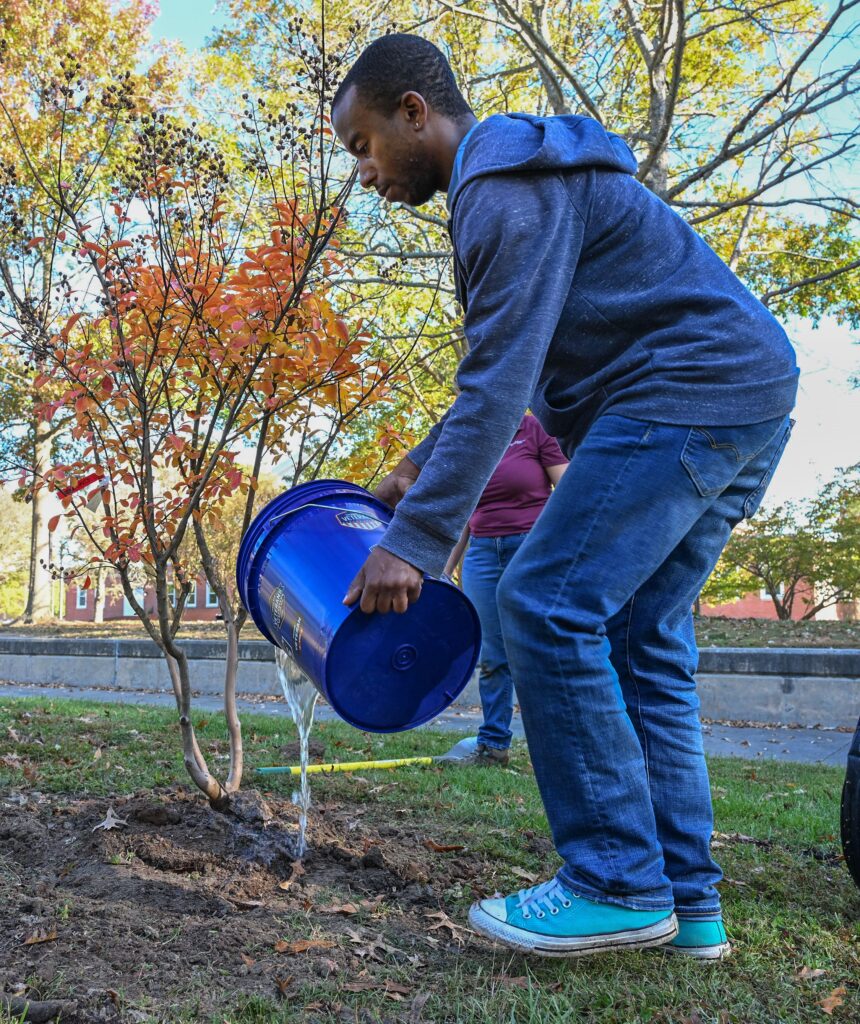
Creating a Center for Urban Forestry at the University of Maryland Eastern Shore is the first step on a four-year climb toward providing the Delmarva Peninsula with a crown of resources when it comes to trees. Community members, arborists and urban foresters from Delaware, Maryland and Virginia, along with students interested in a career in forestry, will benefit from the project.
The university, a Tree Campus USA and home to a cloned sapling from Maryland’s historic Wye Oak tree, will make its commitment to urban forestry official by becoming a public arboretum.
“Our sprawling green campus provides the perfect location since it is home to over 1,000 trees, from approximately 80 taxa (scientifically classified group). To become an accredited arboretum, we must increase the number of labeled taxa to over 100, which will require additional tree plantings,” said Dr. Stephanie Stotts, an associate professor of forest ecology at UMES.
“Urban foresters and students will assign unique accession numbers for every tree on campus, a common practice for museums, and create a walking trail that will include physical signage and interactive maps,” said Stotts.
Annual projects will enhance the site for the community to enjoy with additional plantings, tree care and maintenance, educational workshops and events. A virtual representation of the arboretum will also be made available.
UMES’ center and its activities are funded by the Inflation Reduction Act and the U.S. Department of Agriculture, Forest Service. The $2 million Urban Community Forestry grant is part of $35 million earmarked for the nation’s 1890 land-grant universities to prioritize disadvantaged communities.
The federal program works with state and partner organizations to “improve the health and vibrancy of communities through planting and maintaining trees, forests and green spaces.” The goal of projects it supports is to apply nature-based solutions to economic, social and environmental challenges.
Growing trees for planting, expanding education and more
As part of the grant, UMES’ center will manage funds and provide guidance for community urban forestry projects, which are available through a competitive application process. Awards will be processed using a system developed by the Maryland Community Forest Catalyst Project, said Stotts, who leads the USDA Forest Service project. Stotts also leads UMES’ Forest Ecology Research Lab and specializes in climate change forest dynamics.
The center will also be a resource for forestry professionals to obtain continuing education credits that can be hard to come by on the Eastern Shore of Maryland, forcing them to travel.
“Another way our Urban Forestry Center will support arborists and the community is by establishing a grow out station to meet the demand for trees,” Stotts said. “Several state initiatives, including Maryland’s 5 Million Trees and Delaware’s Tree for Every Delawarean, among other initiatives to increase the nation’s tree canopies, have created the welcome need to supply more trees for plantings.”
“Trees make a difference,” said Matthew Hurd, regional forester, Maryland Forest Service. “Studies show that communities with access to trees and green spaces are associated with improved health outcomes, reduced crime, lower average temperatures, and an influx of other kinds of investments and new economic opportunities.
“Through funding from the Inflation Reduction Act, the USDA Forest Service is making historic investments in boosting the nation’s tree cover in urban, suburban and rural communities nationwide,” Hurd said.
Funding for this project provided by the Inflation Reduction Act and the USDA Forest Service, Urban and Community Forestry Program.
Gail Stephens, agricultural communications and media associate, University of Maryland Eastern Shore, School of Agricultural and Natural Sciences, UMES Extension, gcstephens@umes.edu., 410-621-3850.
Photos by Todd Dudek, agricultural communications, University of Maryland Eastern Shore, School of Agricultural and Natural Sciences, UMES Extension, tdudek@umes.edu.
Below, clockwise:
Agriculture major Logan Doggett, left, and environmental science major Amari Dupree help plant a tree at a small ceremony announcing UMES is to become a public arboretum thanks to a $2 million Urban Community Forestry grant.
Doggett and Dr. Stephanie Stotts, associate professor of forest ecology at UMES, carry a tree to a pre-dug hole for planting.
Newly planted young trees require watering.
Makaela Blackwood, a senior environmental science major, listens as Stotts discusses root balls and associated diameter the hole needs to be dug for planting.
UMES environmental science major Amari Dupree waters the newly planted tree while Dr. Stephan Tubene, professor and chair of UMES’ Department of Agriculture, Food and Resource Sciences, smooths the dirt mound.






